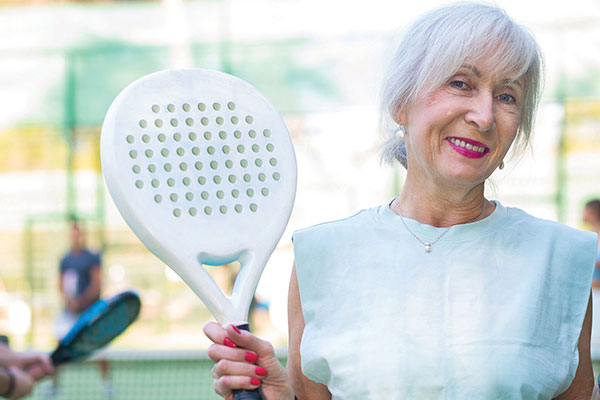
There’s a saying among orthopedic specialists when patients ask how to keep their aging shoulders healthy, moving, and free of stiffness and pain. “Motion is the joint lotion – that’s what we tell our patients frequently,” says Dr. Brian Hill, a board-certified shoulder and elbow surgeon at Palm Beach Orthopaedic Institute who performs surgery at Jupiter Medical Center.
“Moving the joints is critical to keeping them functioning properly.” He and his colleagues frequently recommend activities and exercises that can maintain the health and movement of aging shoulders – including tips on knowing when it’s time to visit a shoulder specialist.
Stretch, warm up, and hydrate
“Keeping the joints lubricated means staying flexible for as long as possible is important as people age,” says Dr. Hill. “Enrolling in activities like yoga and stretching classes and walking clubs are huge for injury prevention. As we age, our tendons and muscles get shorter and tighter, which leads to more injuries.”
Today’s most common cause of sports-related shoulder injuries among older Americans? Pickleball.
“Ten to 15 years ago, high-intensity cross fit training was responsible for a lot of shoulder injuries, but we don’t see as many now with that activity,” he points out. “Most of today’s injuries are from pickleball, especially among people who hadn’t played tennis previously or haven’t done anything physically active before. They look at pickleball and say, ‘Hey, I can do this!’ and start playing without warming up, without stretching or without hydrating first. If they fall, they’re more likely to strain shoulder muscles and cause injury to the shoulder joint.”
Similar injuries can occur among older patients who engage too aggressively in sports like tennis or golf without proper warm-up and stretching, he says.
Know when to seek help
For injured or inflamed shoulders, Dr. Hill recommends icing of the joint and a week of anti-inflammatory medications. If severe injuries or strains remain troublesome after a week, or for shoulder pain that keeps you up at night, see an orthopedic shoulder specialist sooner rather than later for quick intervention and images or scans that can identify the source and possible solutions.
Dr. Hill offers these tips:
- Stretch rotator cuff and shoulder blade muscles regularly. “So many of us have poor posture and rounded shoulders from looking at our computers and phones so much throughout the day,” he points out. “Simple, regular stretches enhance the mechanics of your shoulder and also improve your posture.” Roll the shoulders in both directions slowly and regularly. Standing in a doorway, hold both sides of the door jamb, and slowly walk forward to stretch the front of the shoulders. Stand straight and do slow, gentle head rolls to the right and to the left to stretch out the neck and upper shoulders.
- Engage in less-stressful activities. “I love people being out and active,” he says, “and water sports are activities that almost anyone can do. Swimming is a non-impact sport that’s great for your cardiovascular system, too, and you can do it forever. Getting out and just walking is important, too. Find an activity that you enjoy and stick with it.”
- Opt for surgery only after evaluation by a qualified shoulder specialist who can assess your particular symptoms, causes and solutions.
Dr. Hill encourages older adults to “continue to do what you love, whatever sport or hobby it is — and leave it to us as orthopedic specialists to keep you pain-free so you can continue to enjoy your favorite activities.”
AUTHOR: Brian W. Hill, M.D. is a board-certified shoulder surgeon at Palm Beach Orthopedic Institute. He is an expert in advanced reconstructive and arthroscopic techniques, and serves as an assistant team physician for the Washington Nationals and their affiliates. Dr. Hill treats shoulder injuries and arthritis with a focus on patient-centered care and clear communication.






